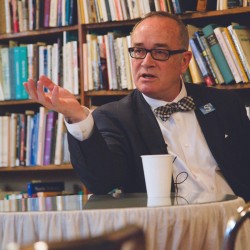Editorial | February 3rd, 2016

A hot topic in North Dakota in recent months has revolved around the desire to statutorily limit the use of college students as confidential undercover informants. This change is supported by the parents of Andrew Sadek, the college student at North Dakota State School of Science in Wahpeton who was strong-armed into becoming an informant after allegedly selling a measly $80 amount worth of marijuana to another informant.
The story has garnered national attention, rightfully so, and clearly put a “Legendary” black eye on this fine state of ours.
Long story short, and without legal counsel present, Sadek was told by a drug task force agent that he faced monumental consequences and up to 40 years in prison. Further, he was told if he were smart, he’d become an undercover informant, which he did. The agent also suggested how far Sadek, as an informant, could conceivably take it by purchasing higher levels of contraband drugs, i.e. meth, heroin, etc.
Eventually, Sadek cut off communications with law enforcement. Who knows why, but you can connect the dots we suspect. Not long later, he walked out of his dorm early in the morning and outright disappeared. His body was found in the Red River north of Breckenridge two months later. He had a gunshot to his head. He was wearing different clothes than when he left the dorm. His backpack was loaded up with rocks. No weapon was found.
Family and friends were unyielding in their reluctance to accept determinations by law enforcement that Sadek committed suicide.
There are so many disturbing and lingering questions stemming from this tragic case that it became the focus of a 60 Minutes television investigation. The topic has also become an issue in the forthcoming governor’s race because incumbent Attorney General Wayne Stenehjem declared that he does not support changing the law allowing law enforcement to utilize college students as informants.
This one tragedy speaks for itself. Yet, we’d suspect that many people, especially journalists with years experience under their belt, recall other situations whereas confidential informants met with an untimely death or were brutalized in indescribable ways.
The one common element, however, is the news stories ultimately get buried. All of a sudden – unless there is a mom and or a dad fighting to uncover the truth – information stops coming from law enforcement. “It’s under investigation. We can’t speak to the case.” Etc.
This writer remembers two such cases clearly, and more than a few others where family and friends simply believed the truth was being covered up.
For example, not far from here and over toward Lakes Country in Minnesota, well over a decade ago we had extensive communications with the mom of an underage son who had reportedly committed suicide by hanging himself in his bedroom in some form of autoerotic asphyxiation. Typically, even beyond the notion of suicide, the mention of self-induced death by autoerotic asphyxiation stops family in their tracks and they are emotionally incapable of mounting a defense or fighting what law enforcement said happened.
But this mom fought it. And she ultimately prevailed in court. As it turns out, a pop can and cigarette butts in the bedroom – which did not warrant interest of investigators – were proof that the boy was not alone when he died. Despite all investigators said and did – or did not do – the mother persisted. A civil suit later prevailed against that 30-plus-year-old man. Heck, he was there mingling and grieving with the family after the body was found. The civil suit proved his he was an accomplice to the death. It also answered why he was not a suspect in the first place. He was an informant.
Perhaps most disturbing of all, a second teenage boy died under virtually the same circumstances in the same time frame and only a short distance farther into Lakes Country; except in that instance the family was paralyzed with emotion and could not take it further, understandably so.
Another example. This one in northern North Dakota about two decades ago. Early in the morning, a man was found hogtied and absolutely brutalized alongside a rural country road. He was still alive. The county sheriff at that time stated that he had never seen anything so brutal in his career. But, wouldn’t you know, the case went cold. Information quit coming. People soon forgot. Later the truth surfaced – off the record, of course. The victim was an undercover informant and this was “a message” to law enforcement. A dead man could not have shared detail at all, how gruesome it was, and why.
HPR joins the Andrew Sadek family and the general public in demanding elimination of laws allowing college students to be used as undercover informants. We urge the legislature and state leaders to stop it all, not just college students as undercover informants, but all people, for God’s sake.
If any of you know other such stories about the use of confidential informants, email jas@hpr1.com or mail to us at 124 8th St. N, Fargo ND 58102. Together we can get these legal wrongs righted, at least for future generations.
February 16th 2026
January 15th 2026
December 18th 2025
November 18th 2025
October 15th 2025



__293px-wide.png)
_(1)_(1)_(1)_(1)_(1)__293px-wide.jpg)
_(1)__293px-wide.jpg)